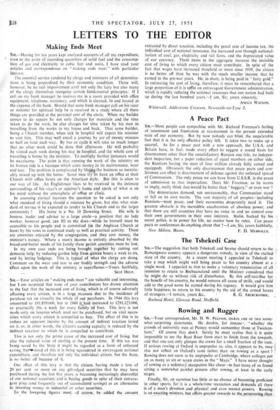SIR.—Your articles on "makin g ends meet are valuable and interestin g ,
but I am surprised that none of your contributors has drawn attention to the fact that the increased cost of living-, which is of course adversely affecting every citizen, is in a large, measure due to the incidence of purchase tax on virtually the whole of our purchases. In 1944 this levy amounted to £91,859,000, but in 1949 iVi-ihad increased to £291,123,000, or practically 10s. a week for every family of four. This levy is not made only on luxuries which need not be purchased, but on vital neces- sities which every citizen is compelled to buy. The effect of this is to reduce an apparent income by the amount of indirect taxation levied on it, or, in other words, the citizen's earning capacity is reduced by the indirect taxation to which he is compelled to contribute.
This is not only the prime cause of the increased cost of living, but also the reduced value of sterling at the present time. If this tax was being saved by the State it might be regarded as a form of enforced saving, butt-40.stead of this it is being squandered in extravagant national expenditure, and therefore not only the individual citizen, but the State, is no better off because of it.
One effect of. this levy is that the citizen, having made a loss of 20 per cent or more on any gilt-edged securities that he may have purchased during the last five years, is becoming increasingly distrustful of our national securities, and is buying goods in spite of their extrava- Aant price (and frequently out of accumulated savings) as an alternative tb investing money in industrial or other securities.
To the foregoing figures must, of course, be added the amount
extracted by direct taxation, including the penal rate of income tax, the individual cost of national insurance, the increased cost through national- isation of coal, gas, electricity and rail fares, and the depreciated value of our currency. Theie items in the aggregate increase the invisible cost of living to which every citizen must contribute. In spite of the fact that wages have increased threefold or more since 1939, the citizen is no better off than he was with the much smaller income that he earned in the pre-war years. He, in short, is being paid in "fairy gold." In estimating the cost of living, therefore, it must be remembered that a large proportion of it is sptrnt on extravagant Government administration, which is rapidly reducing the national resources that our nation had built up during the last hundred years.—I am, Sir, yours sincerely,
ANGUS WATSON.
Whitewell, Adderstone Crescent, Newcastle-on-Tyne 2.


































 Previous page
Previous page